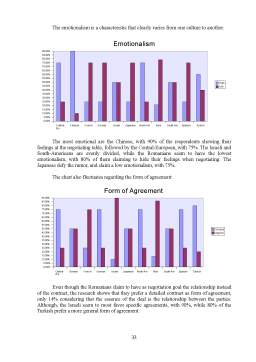Cuprins
- INTRODUCTION 3
- 1. A GENERAL OVERVIEW ON ORGANIZATIONAL CULTURE 4
- 1.1. Culture at the Root of Communication Challenges 4
- 1.2. Six Fundamental Patterns of Cultural Differences 5
- 1.3. Respecting Our Differences and Working Together 7
- 1.4. Understanding Organizational Culture 8
- 2. APPROACHING CROSS-CULTURAL NEGOTIATIONS 11
- 2.1. Entering into Cross-Cultural Negotiations 11
- 2.2. Cultural Approaches to Negotiation 12
- 2.3. Analyzing Cultural Differences as they Relate to Negotiation 13
- 2.4. The Top Ten Ways Culture Affects Negotiating Style 16
- 3. TECHNIQUES OF ACKNOWLEDGEING CULTURAL DIFFERENCES
- IN NEGOTIATION 20
- 3.1. Tactics and Strategies in Cross-Cultural Negotiations 20
- 3.2. Negotiating Patterns Associated with National and Regional Cultures 21
- 3.3. Applying Cross-Cultural Lessons to Day-To-Day Negotiations 23
- 4. CULTURAL DIFFERENCES QUESTIONNAIRE 25
- 4.1. Sample 25
- 4.2. Research Instrument 25
- 4.3. Research Findings 27
- CONCLUSION 36
- REFERENCES 37
- ANNEXES
Extras din proiect
INTRODUCTION
In this age of the global economy, cross-cultural negotiation is becoming an increasingly important part of the management and marketing process for nearly every company. In order to succeed in a negotiation it is essential to learn as much as you can about your counterpart, it requires a thorough understanding of the additional complexity regarding the parties' communications with each other. This includes studying your counterpart's mentality, habits,attitudes, beliefs, behaviors and all the elements composing ones culture.
Cross-cultural negotiations are always very challenging because of the different cultures and business environments. Unfortunately, people do not realize these challenges before starting the negotiations - mainly because cultural differences are subtle and are often invisible. The purpose of this paper is to point out these differences and the fact that cross-cultural awareness is vital when negotiating inter-culturally. Cross-cultural negotiations present special challenges that must be understood and mastered if one wants to most effectively accomplish their goals in an increasingly common international environment.
This paper emphasizes a few and the most important aspects to be taken into consideration when negotiating across cultures. The study containing a simple but conclusive questionnaire, supports the theoretical aspects of the paper.
The documentation on the basis of which the paper is structured consists of numerous articles about cross-cultural and international negotiation and communication. For the theoretical parts I have taken into consideration Professor's Geert Hofstede, from Maastricht University, study on Cultural Dimensions. The practical section of the paper contains a questionnaire about different styles of negotiation, and its subjects were selected from different nationalities, in order to point out the cultural differences.
After reading this paper, one should have acknowledged the most important inter-cultural differences that may appear in the negotiating process, and also should have gained a basis on which to enter into cross-cultural negotiations.
As international business expands both in volume and scope the frequency and importance of cross-cultural negotiation will continue to grow, thus knowledge about cross-cultural behaviors and typologies is compulsory.
1. A GENERAL OVERVIEW ON ORGANIZATIONAL CULTURE
1.1. Culture at The Root of Communication Challenges
We all communicate with others all the time -- in our homes, in our workplaces, in the groups we belong to, and in the community. No matter how well we think we understand each other, communication is hard. "Culture" is often at the root of communication challenges. Our culture influences how we approach problems, and how we participate in groups and in communities. When we participate in groups we are often surprised at how differently people approach their work together.
Culture is the cumulative result of experience, values, religion, beliefs, attitudes, meanings, knowledge, social organizations, procedures, timing, roles, spatial relations, concepts of the universe and material objects and possessions acquired or created by groups of people, in the course of generations, through individual and group effort and interactions. Culture manifests itself in patterns of language, behavior and activities and provides models and norms for acceptable day-to-day interactions and styles of communication. Culture enables people to live together in a society within a given geographic environment, at a given state of technical development and at a particular moment in time (adapted from Samovar and Porter, 1972).
Culture is a complex concept, with many different definitions. But, simply put, "culture" refers to a group or community with which we share common experiences that shape the way we understand the world. It includes groups that we are born into, such as gender, race, or national origin. It also includes groups we join or become part of. For example, we can acquire a new culture by moving to a new region, by a change in our economic status, or by becoming disabled. When we think of culture this broadly, we realize we all belong to many cultures at once.
In a world as complex as ours, each of us is shaped by many factors, and culture is one of the powerful forces that acts on us. Anthropologists Kevin Avruch and Peter Black explain the importance of culture this way:
Preview document
Conținut arhivă zip
- Intercultural Differenes in Negotiations.doc











































